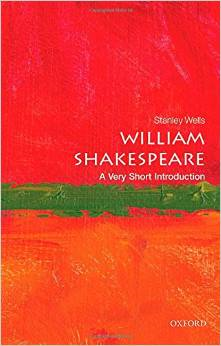
April 5, 2015, by Peter Kirwan
William Shakespeare: A Very Short Introduction by Stanley Wells
This month, Oxford University Press publishes William Shakespeare: A Very Short Introduction by one of the most esteemed living authors on Shakespeare, Stanley Wells. Wells, in addition to being one of our finest textual scholars, has devoted much of the last decade to a series of books aimed at a popular market, expanding his role as Honorary President of the Shakespeare Birthplace Trust to produce volumes through which a wider audience might be introduced to Shakespeare. At times, this comes across as somewhat evangelical (‘On the other hand there are many good reasons why it is worth allowing him into your life’, xv), or even a little patronising (as his preface imagines what people who don’t have an everyday encounter with Shakespeare do do with their lives), but this is Wells doing what no-one else does better – introducing Shakespeare with wit and intelligence to a non-specialist audience. The fact that a third of the ‘Further Reading’ section is books written or edited by Wells could be hubristic, but in fact fairly points to the fact that no other scholar has dedicated themselves in such a way to producing Shakespeare books for the general reader.
Wells’s book replaces the previous Shakespeare: A Very Short Introduction by Germaine Greer, even taking over that volume’s series number (60). Presumably Greer’s book will be quietly withdrawn, which seems a shame; while it is right and proper that a new volume be written specifically for the VSI series (Greer’s book is a repackaging of her 1986 volume for the Past Masters series, and therefore never sat entirely comfortably within the VSI project), Greer’s book has much to recommend it. Her comments on the inscrutability of Shakespeare’s own opinions remain pertinent; her eloquent readings of the plays continue to yield interesting interpretive fruit; her literary situation of Shakespeare’s work within classical and philosophical precedent is of its time, yet learned and erudite. Her breakdown of her exploration of Shakespeare into such intellectual categories as ‘Ethics’, ‘Politics’, ‘Teleology’ and ‘Sociology’ allows for fluid readings that bring several plays into conversation with one another, and I hope that her book remains available in some modest form, if not in this series.
Wells offers what I take to be a more intuitive (and therefore more appropriate to the series) approach. His first chapter, perhaps inevitably, covers much of same ground as Greer’s, surveying what is known of the life, with a particular emphasis (unsurprising, given Wells’s professional responsibilities) on Stratford-upon-Avon. What is more immediately valuable is Well’s emphasis on the theatre, barely discussed in Greer’s volume (in fact Greer is unhelpfully dismissive of modern production, while Wells shows a much more modern, and clearly informed, grasp of the central significance of the theatre). There are many other advantages to an approach informed by modern scholarship, including an understanding of collaboration and mentions of plays less traditionally discussed such as Edward III.
The bulk of Wells’s volume is taken up by five chapters which introduce each of the plays in turn, and it is here that I feel Wells’s sense of his audience may be a little off. For the person unfamiliar with these plays, the summaries of what their contents actually are is very cursory (the brief section on The Merry Wives of Windsor, for instance, mentions the anecdote of the occasion of the play’s writing, and the comedy of several episodes, but assumes independent knowledge of the play), and seems to me to imagine an audience who knows the plays and wants to know a little more the achievement of each, rather than the audience who is perhaps coming almost fresh to Shakespeare as implied in the preface. But, for the former kind of audience, Wells’s readings are unsurpassed. He parses the key elements of the plays effectively, drawing together selected quotations, shared ideas and literary judgements to offer a guide through the canon that is never less than lively, incisive and entertaining.
To pick out highlights rather spoils the effect of the whole, but I was struck especially by Wells’s take on the biting satire of Troilus and Timon – with particular attention to the latter play’s potential for ascension to tragic status – and the emphasis on the importance of Henry VI in his own plays (on a personal note, for a popular book I’d have recommended sticking with the far neater and more popularly known titles of Henry VI Parts 2 and 3 rather than the lengthy Contention titles, but I can’t fault Wells’s integrity in retaining the Oxford preferences). Even though there is little space to develop readings, Wells makes space for every play, and his chapter structure (grouping plays linked by genre or setting) maps the broad arcs of Shakespeare’s career, even suggesting that his career may have ended with a sacking rather than retirement.
There are a couple of scattered errors which I note here in the hope they will be corrected in future editions – it is Sir Andrew Aguecheek, not Sir Antony (p.79) who woos Olivia, and Hamnet died in 1596, not 1586 (p.88). But mostly this is a fair, judicious and readable introduction to Shakespeare, best read alongside the ambitious newcomer’s attempt to make their way through the dramatic canon. A very cursory epilogue settles for listing some of the response texts which will allow readers to find their way through the vast field of appropriations, but this little book commendably concerns itself with author and works, offering repeated insight and a thorough survey of the texts that began it.
Many thanks to Oxford University Press for the review copy.
No comments yet, fill out a comment to be the first

Leave a Reply